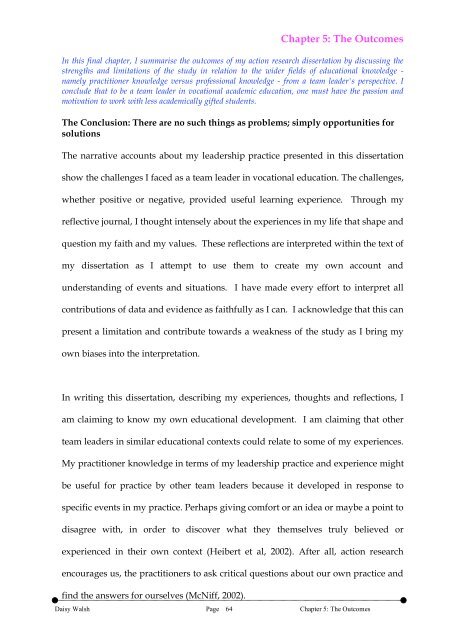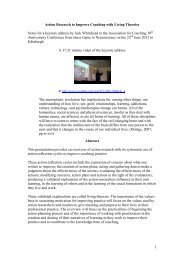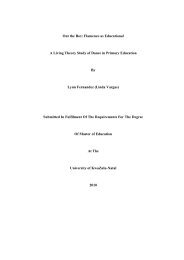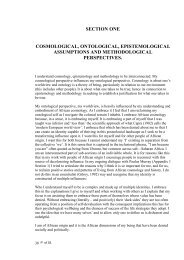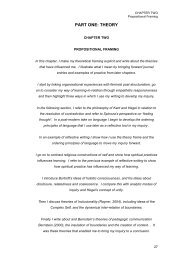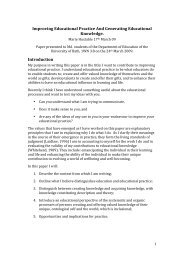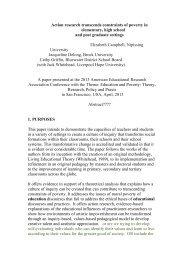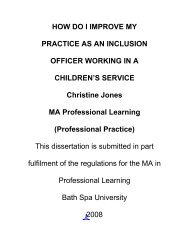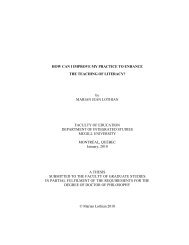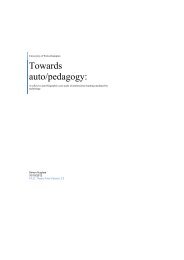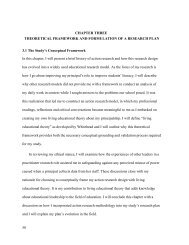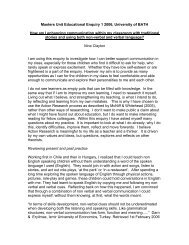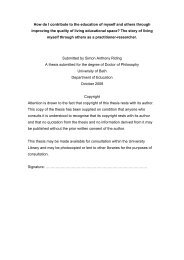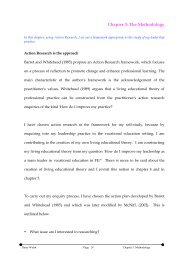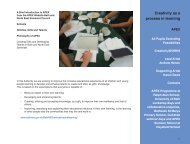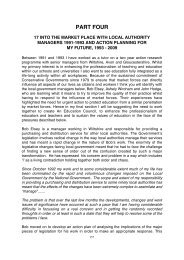Chapter 5: The Outcomes - Action Research @ actionresearch.net
Chapter 5: The Outcomes - Action Research @ actionresearch.net
Chapter 5: The Outcomes - Action Research @ actionresearch.net
Create successful ePaper yourself
Turn your PDF publications into a flip-book with our unique Google optimized e-Paper software.
<strong>Chapter</strong> 5: <strong>The</strong> <strong>Outcomes</strong><br />
In this final chapter, I summarise the outcomes of my action research dissertation by discussing the<br />
strengths and limitations of the study in relation to the wider fields of educational knowledge -<br />
namely practitioner knowledge versus professional knowledge - from a team leader's perspective. I<br />
conclude that to be a team leader in vocational academic education, one must have the passion and<br />
motivation to work with less academically gifted students.<br />
<strong>The</strong> Conclusion: <strong>The</strong>re are no such things as problems; simply opportunities for<br />
solutions<br />
<strong>The</strong> narrative accounts about my leadership practice presented in this dissertation<br />
show the challenges I faced as a team leader in vocational education. <strong>The</strong> challenges,<br />
whether positive or negative, provided useful learning experience. Through my<br />
reflective journal, I thought intensely about the experiences in my life that shape and<br />
question my faith and my values. <strong>The</strong>se reflections are interpreted within the text of<br />
my dissertation as I attempt to use them to create my own account and<br />
understanding of events and situations. I have made every effort to interpret all<br />
contributions of data and evidence as faithfully as I can. I acknowledge that this can<br />
present a limitation and contribute towards a weakness of the study as I bring my<br />
own biases into the interpretation.<br />
In writing this dissertation, describing my experiences, thoughts and reflections, I<br />
am claiming to know my own educational development. I am claiming that other<br />
team leaders in similar educational contexts could relate to some of my experiences.<br />
My practitioner knowledge in terms of my leadership practice and experience might<br />
be useful for practice by other team leaders because it developed in response to<br />
specific events in my practice. Perhaps giving comfort or an idea or maybe a point to<br />
disagree with, in order to discover what they themselves truly believed or<br />
experienced in their own context (Heibert et al, 2002). After all, action research<br />
encourages us, the practitioners to ask critical questions about our own practice and<br />
find the answers for ourselves (McNiff, 2002).<br />
Daisy Walsh Page 64<br />
<strong>Chapter</strong> 5: <strong>The</strong> <strong>Outcomes</strong>
In addressing the problems of practice, Heibert et al, (2002) recognise the limitations<br />
that knowledge linked with practice is grounded in the context of the situation,<br />
setting or environment. As such, they recommend that the processes that yield<br />
knowledge of this sort are collaborative and involve practitioners working and<br />
engaging together to create professional knowledge that is linked to practice.<br />
Collaboration - a process considered central to successful professional development<br />
programs - ensures that what is discovered will be communicable because it is<br />
discovered in the context of group discussion (Heibert et al, 2002).<br />
Whilst there is no doubt that practitioner knowledge possesses positive features<br />
(Whitehead, 1993, Heibert et al, 2002), there are shortcomings [to practitioner<br />
knowledge] that have prevented it from becoming a knowledge base (professional<br />
knowledge) for the teaching profession. Professional knowledge must be made<br />
public and be presented in such a way that it can be communicated among<br />
colleagues. Collaboration therefore seems to be the answer for the development of<br />
professional knowledge, not because collaboration provides the practitioners with<br />
social support groups, but because collaboration forces their participants to make<br />
their knowledge public and be understood by colleagues (Heibert et al, 2002). I do<br />
not deny the importance of collaborative research. But I also believe there is an<br />
increasingly growing awareness of the richness of practitioner's knowledge, which is<br />
context specific and to which many could relate to if put in the public domain. For<br />
this reason, in making public my dissertation, I believe I am contributing, in part, to<br />
the professional knowledge base. In addition, throughout this dissertation I have<br />
attempted, as much as possible, to represent leadership theories with examples.<br />
Leading alongside members of our team, preparing the environment and creating<br />
Daisy Walsh Page 65<br />
<strong>Chapter</strong> 5: <strong>The</strong> <strong>Outcomes</strong>
opportunities for growth, I demonstrated characteristics of transformational<br />
leadership, and by playing an active role (as Vocational GCE ICT consultant) in<br />
shaping the vocational 'A' level GCE ICT with the government education body -<br />
QCA - I am keeping abreast of instructional leadership for the benefit of our team<br />
(Sawbridge, 2000).<br />
<strong>The</strong>ories offer abstract knowledge that transcends particular contexts and ensure<br />
that the knowledge rises above idiosyncratic technique (Heibert et al, 2002).<br />
<strong>The</strong>ories, therefore, are hallmarks of professional knowledge (Yinger, 1999) whilst<br />
examples keep the theories grounded in practice and reveal the meaning of verbal<br />
propositions (Heibert et al, 2002).<br />
Being a team leader in FE is a stimulating and challenging job. It can be repetitive,<br />
terribly stressful and sometimes wonderfully fun. No two days are the same. One<br />
does not know what each day will bring, what conflict to deal with, what different<br />
or life-changing experience one would bring to the students and the team. <strong>The</strong>re are<br />
fantastic, gratifying and exhilarating moments. Some of the good moments come at<br />
the end of the academic year. Seeing the students’ achievement at their 'graduation'<br />
ceremony, how they have progressed, their growth in maturity and the positive<br />
change in their ability and understanding of ICT; the thank you card (Appendix I),<br />
the flowers, the box of chocolates. <strong>The</strong> gifts may be small in gesture but are big in<br />
meaning. Acknowledgements and thanks (Appendix B) come in various shapes and<br />
forms.<br />
But being a team leader can also seriously damage your health. Dealing with conflict<br />
and with difficult team members can be draining and very stressful. Life can throw<br />
Daisy Walsh Page 66<br />
<strong>Chapter</strong> 5: <strong>The</strong> <strong>Outcomes</strong>
up some tough situations. In examining my own practice and my coping strategies, I<br />
imagine a way forward. For some of the time, the way forward could be an<br />
encouragement from a critical friend or a suggestion from one of our team members<br />
- 'As a team, we could benefit from having a more structured approach to new<br />
staff'(Appendix A). I try it out, monitor what I do, seek evidence of improvement<br />
and review and evaluate the action (McNiff, 2002). I am creating a living form of<br />
educational theory (Whitehead, 1993). By using action research as an intervention in<br />
my personal practice, I believe my mental, physical and spiritual makeup have been<br />
strengthened and improved to cope with stressful events. I have been challenged to<br />
acknowledge my racial identity in my study. I certainly feel better equipped to deal<br />
with the Maggie of this world.<br />
To be a team leader (and indeed any leader) in the twenty-first century means so<br />
many things to so many people. Coming from a diversity of backgrounds and<br />
upbringings, educational standpoints and value-based dimensions, this intense<br />
variety of perspectives can be grounds both for excited sharing and vivid<br />
disagreement.<br />
And when confronted with contradictions that question our<br />
leadership style and value stance, we can either be overwhelmed by the<br />
discrepancies or reaffirmed in our choice of leadership. But, it is precisely this<br />
wealth of opinion, this multitude of visions, that, through their sharing, can help us<br />
grow in our own leadership style knowing each one of us is unique in our own ways<br />
and understanding. Through the sharing of ideas, that understanding can<br />
strengthen more deeply our own perceptions.<br />
As more and more students become disaffected and disinterested in schools,<br />
vocational academic education in FE offers a lifeline, another opportunity to fulfil<br />
Daisy Walsh Page 67<br />
<strong>Chapter</strong> 5: <strong>The</strong> <strong>Outcomes</strong>
their potential as an individual. I firmly believe that society can do better than to<br />
judge disaffected and disinterested school leavers according to their GCSE results.<br />
Judging learners by their academic ability is not necessarily and not always a<br />
measurement of their capability as an individual. This is confirmed by Tomlinson<br />
(2004) reform proposals for 14 to 19 year-old qualifications in which he proposes a<br />
new education framework that would cater for students of all abilities, giving equal<br />
status to vocational and academic study. In the meantime, the availability of a choice<br />
of vocational programme in FE Colleges ensures that non-academic learners have an<br />
outlet to pursue their chosen vocation or get help to make a more informed career<br />
choice. In my view, the leaders of vocational programmes must be attuned to the<br />
needs of these students.<br />
It is imperative that team leaders in such vocational settings understand the nature<br />
of these students and guide their learning accordingly through working examples of<br />
teaching and learning strategies that place the learner at the heart of it all. A team<br />
leader that can carry out performance reviews on team members in a holistic<br />
fashion; a team leader that can lead educational innovation and be prepared to try<br />
out new ideas; a team leader that is able to reflect critically and be open to scrutiny;<br />
a team leader that can motivate the team to secure and maintain high quality<br />
student experiences and provide professional support and coordinate teaching. As<br />
Mortimer et al, (1988) and Horsfall (2001) point out, improvements in educational<br />
outcomes provide a strong link between the relationship of team activity, lead by<br />
effective team leaders, and learner outcomes.<br />
Part of the deal of this dissertation is a commitment to working on myself; to aim to<br />
understand my life; to improve what I am. <strong>The</strong> notes of reflection in the journal<br />
Daisy Walsh Page 68<br />
<strong>Chapter</strong> 5: <strong>The</strong> <strong>Outcomes</strong>
show this process. <strong>The</strong> lessons learnt are always helpful. One of life’s best lessons<br />
comes from learning from failure. Knowing our weaknesses and acting on them will<br />
enable us to turn them into strengths.<br />
Each one of us lives according to our own values. <strong>Action</strong> research, according to<br />
McNiff (2002) begins with values. I believe in the philosophy of hard work, selfbelief<br />
and lifelong learning for all, regardless of family background, ethnicity and<br />
racial identity and respect, both for self and for others - treat others as we would like<br />
to be treated. My parents imbued these values in me. I was inspired and spurred on<br />
by a driven and remarkable mother. As a strong and loving mother, she is my<br />
greatest motivator. She inspires me in my daily life.<br />
<strong>The</strong>re is still much to learn about team leadership and this dissertation is by no<br />
means the end of my journey. Life experience informs our view and we either<br />
change according to our perception of our experience or ignore the experience<br />
altogether. Emotional Intelligence plays a crucial role in our ability to respond and<br />
control our behaviour and action. We are in charge of our behaviour. Being a team<br />
leader teaches me, frustrates me, supports me and confronts me. It is a choice that I<br />
made three years ago when I was appointed and continue to make each day,<br />
because I believe I have grown through the trials and triumphs of my experiences.<br />
With the documentation in this dissertation, I am hoping that I am contributing to<br />
the notion of more effective team leadership in vocational education in FE. I know<br />
that we are all unique individuals with different coping strategies, values and levels<br />
of commitment and motivation. But I hope that team leaders in FE throughout the<br />
UK and beyond will be able to identify with my experience as a team leader. My<br />
Daisy Walsh Page 69<br />
<strong>Chapter</strong> 5: <strong>The</strong> <strong>Outcomes</strong>
professional development in understanding more about how to improve my<br />
leadership in vocational education in FE continues. My understanding of my<br />
leadership practice, which began three years ago, has only just started. But I am<br />
sure that where I am now is the place that I am meant to grow from, with team<br />
members around me that both help and hinder, and situations that will both<br />
frustrate and liberate. I have a lot more still to learn both personally and<br />
professionally. My leadership journey has only begun.<br />
I hope that having read my experiences, you too will grow through your own<br />
unique experiences.<br />
Team leader is not a job that I do. I am a team leader.<br />
€<br />
Daisy Walsh Page 70<br />
<strong>Chapter</strong> 5: <strong>The</strong> <strong>Outcomes</strong>


